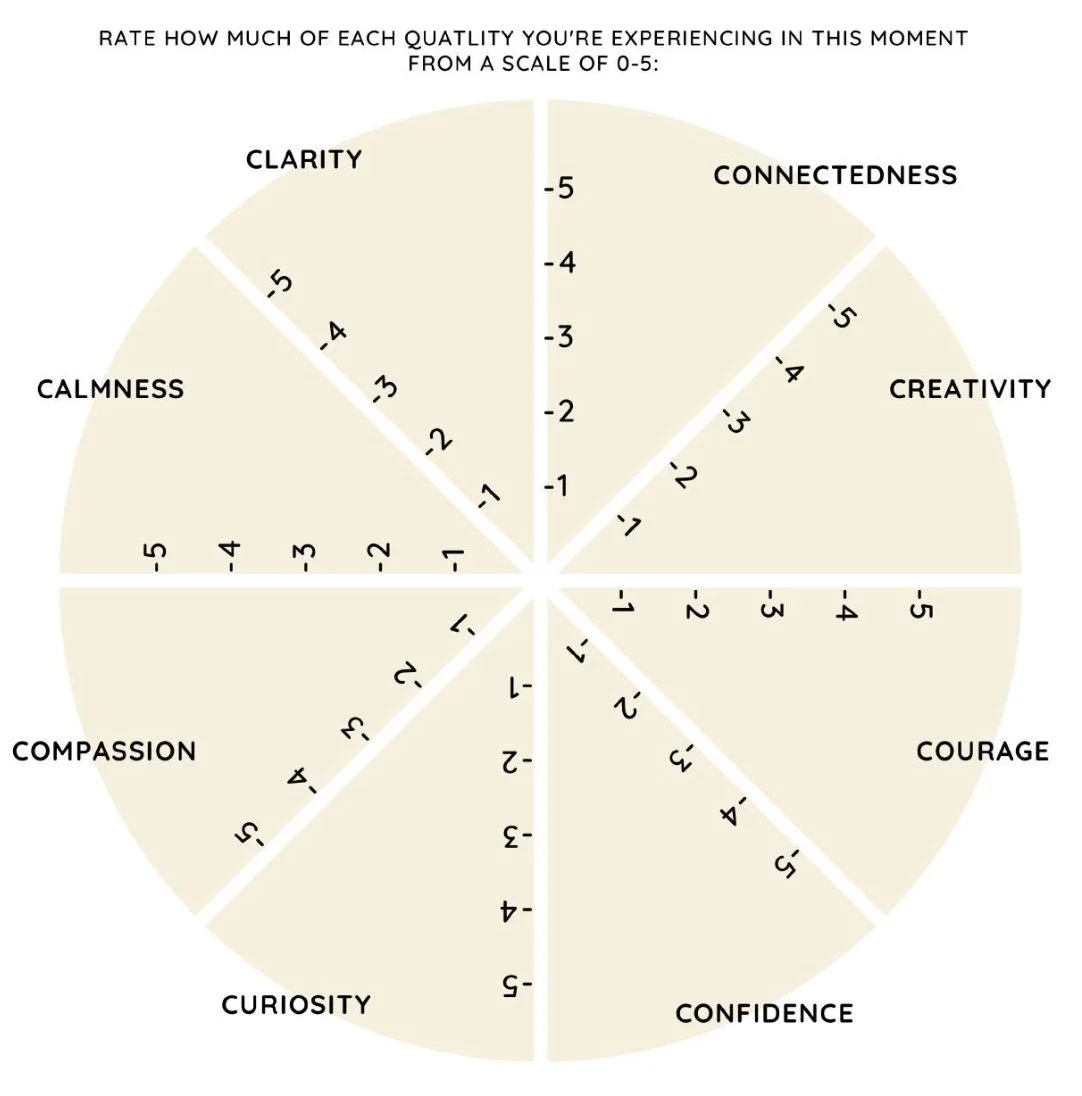No Bad Parts: A Guide to Internal Family Systems (IFS) Therapy
Trauma and grief can leave us feeling overwhelmed, lost, and disconnected from ourselves.
Especially if we’re used to being in control and approaching challenges with logical, rational solutions.
These experiences often trigger intense emotions and coping mechanisms that can be difficult to manage.
As a therapist specializing in Internal Family Systems (IFS), I've witnessed firsthand the transformative power of IFS in helping individuals heal from these experiences.
This guide is for you if you're ready to explore a different, more compassionate way to understand your inner world and connect with your authentic self.
What is IFS?
Internal Family Systems (IFS) therapy, developed by Dr. Richard Schwartz and popularized by his book "No Bad Parts," takes a gentle approach to untangling our inner world.
It's an approach that honors every single part of you.
IFS is built on a few core beliefs. The first is that every person has a true, core Self at their center, which is the source of all wisdom and healing. The second is that our minds are made up of different sub-personalities or "parts."
Every single one of these parts has a positive intention, even the ones that cause us pain.
They are not who we are, but they are all trying to help us.
IFS is a non-pathologizing approach.
This means it doesn't view you as "broken" or "sick." Instead, it sees your inner system as a collection of different parts with different roles, much like a family.
When a family is in distress, the family members may take on extreme roles to help. For example, one person might become the peacemaker and another might become the angry rebel. Your internal family is the same.
When you experience trauma or grief, your parts take on roles to protect you. The goal of IFS is not to eliminate these parts but to understand them with compassion and help them relax from their extreme jobs.
Understanding Ourselves Through IFS
IFS offers a unique framework for understanding our inner world. It views us as a system of interconnected parts, each with its own thoughts, feelings, and motivations.
Some parts may carry the pain of the trauma or grief (exiled parts), while others may try to protect us from those feelings (protective parts).
The goal of IFS therapy is to help us develop a relationship with our authentic Self, the core of who we are, that is wise, compassionate, and resourceful.
By prioritizing connection with our authentic, whole Self, IFS offers a powerful path to self-understanding and healing.
In IFS, there are three primary types of parts:
Managers:
These parts take on roles of responsibility and control. They are the planners, the critics, and the organizers in your system. Their job is to protect you and prevent the pain of your exiled parts from surfacing.
They might show up as the part that overworks you, the part that worries constantly, or the part that is overly critical of you. Their intention is to help you avoid future pain, even if their methods can be exhausting.
Firefighters:
These parts respond reactively to distress. When an exiled part's pain breaks through the manager's defenses, firefighters leap into action to douse the emotional flames. They are often impulsive and can take on extreme behaviors to distract you from the pain.
This might look like binge-watching TV, overeating, or even using substances. They are not trying to harm you. They are just doing whatever it takes to numb the emotional discomfort.
Exiles:
These parts hold onto past traumas, hurts, and vulnerabilities. They are the younger parts of us that were hurt and then pushed away by our protective parts.
They often reside deep within our psyche and can influence our present-day experiences with their intense emotions.
Their pain is what the managers and firefighters are constantly trying to avoid or suppress.
The Self in IFS
Central to the IFS model is the concept of the Self—an inner core of wisdom, compassion, and authenticity that serves as the true essence of who we are.
The Self is not a part.
The Self is separate from the parts and is always there. It cannot be damaged, and it doesn't need to be earned. The Self is you at your most calm, clear, and compassionate.
The Self is like the sun, and parts are like the planets and moon that eclipse it.
Through the process of IFS therapy, we learn to access and cultivate a relationship with our Self.
We use the Self to witness our parts without judgment, which is the first step toward healing, integration, and inner harmony.
The Self is the leader of your internal system, and it is the only one who can bring true peace to all your parts.
The 8 C's of Self
In IFS therapy, the Self is characterized by eight key qualities, which are often referred to as the 8 C's.
When you can access these qualities in a session, you know your Self is present and leading the way.
These are not states of being, they are more like qualities in a specific moment.
Curiosity: The Self approaches internal experiences and emotions with openness and curiosity. It seeks to understand a part rather than react impulsively to it.
Compassion: The Self embodies a deep sense of compassion and empathy towards oneself and others. It offers kindness and understanding even in the face of a part's difficult behavior or pain.
Clarity: The Self possesses clarity of thought and perspective. It allows for insight and understanding even in moments of confusion or distress.
Courage: The Self embodies courage and resilience. It faces challenges and uncertainties with strength and determination, and it is willing to approach a part that has been exiled for a long time.
Creativity: The Self embraces creativity and innovation. It allows for flexibility and adaptability in navigating life's complexities and uncertainties.
Connectedness: The Self fosters a sense of connectedness and interdependence with oneself, one's parts, and the world around them. It recognizes the inherent unity and interrelatedness of all beings.
Calm: The Self is calm and centered. It provides a peaceful presence that helps to soothe and regulate the emotions of the parts.
Confidence: The Self possesses confidence and self-assurance. It trusts in its own ability to lead the internal system toward healing and wholeness.
Use this wheel to think about the amount of each quality of self is present in a certain moment.
How IFS Can Support Your Healing Journey
An IFS therapist approaches trauma, grief, and self-confidence with a compassionate perspective, moving with curiosity, and recognizing the intricate interplay of internal parts within your psyche.
They are curious about their Self and know that their own parts need tending to in order to show up for their client.
Healing Trauma
Trauma can leave you feeling fragmented, disconnected from yourself, and under constant guard.
That's because your internal system, made up of different parts with unique roles, activates protective parts to shield you from further harm.
These protectors might keep you from getting close to others or might cause you to feel numb. The exiles that hold the trauma may feel like they are still living in the past, carrying the weight of the event.
A part might show up as a "wall" or a "heaviness" in your chest, trying to block you from feeling anything at all.
In IFS therapy, I create a supportive and compassionate space for you to explore your experiences at your own pace.
We'll gently work together to identify and connect with the wounded parts that hold the memories and emotions of your trauma.
I’ll offer my self energy to connect with your protetor parts while your self energy isn’t able to hold the hurt - yet.
By fostering a compassionate and non-judgmental relationship with these parts, you'll begin to release stored trauma, integrate fragmented aspects of yourself, and reclaim a sense of security, empowerment, and wholeness.
This isn't about reliving the trauma.
It's about letting your Self witness your exiled parts so they can finally feel seen and loved. They can unburden.
Navigating Grief
Grief is a complex journey. I would know as I’ve felt this one personally. You might experience a wave of emotions—sadness, anger, guilt, longing—all valid and deserving of space.
In IFS therapy, I'll help you access and honor these emotions, allowing each part of you impacted by loss to be seen, heard, and validated.
One part might feel stuck in a memory of your loved one, while another part might feel a heavy sense of guilt for things you said or didn't say.
Often, grief triggers a lot of protective parts. One part might want to cry all the time, and another part might try to shut that down completely. One part might feel a lot of anger, and another part might shame it for feeling that way.
Through compassionate witnessing and exploration, we'll navigate the waves of grief together.
You'll learn to integrate your loss into your broader sense of Self and find meaning and acceptance amidst the pain.
By fostering a connection with your Self—the core of your wisdom and compassion—you'll cultivate resilience, find solace during hardship, and ultimately move forward with greater peace and acceptance.
Fostering Self-Confidence
Do you struggle with self-doubt, insecurity, or feelings of inadequacy?
These emotions often stem from different parts within you trying to protect you from perceived threats. For example, a part that constantly criticizes you might be a protector trying to get you to be perfect so you'll never be hurt or rejected again.
In IFS therapy, I create a supportive space where you can identify and connect with these protective parts. We'll learn to understand the origins of your self-doubt and uncover the beliefs and emotions driving them.
By fostering a deeper connection with your Self—the energy of your inner wisdom, strength, and authenticity—you'll cultivate self-compassion, challenge limiting beliefs, and build a more solid foundation of self-worth and confidence.
The goal isn't to get rid of the critical part. It's to thank it for trying to help and give it a new job.
The Benefits of IFS for Trauma and Grief Recovery
IFS offers several advantages over traditional approaches to trauma and grief therapy.
Here are a few key benefits:
Increased Self-Compassion
IFS teaches us to view ourselves with understanding rather than judgment. This is a crucial step in healing. By understanding that a part is just trying to protect us, we can begin to see ourselves with kindness.
This fosters self-acceptance and allows us to heal with greater compassion towards ourselves. This is a foundational element that is vital for long-lasting change.
Empowerment
IFS helps us reconnect with our inner strength and resources. We learn that we are not our parts. We learn that we have a core Self that can guide us.
This helps us manage difficult emotions and navigate challenges from a place of power and choice, rather than feeling like a victim of our emotions. We learn to become a compassionate leader for our internal system.
Deeper Connection to Ourselves
By developing a relationship with our authentic Self, we gain a deeper sense of who we are. We move from a place of fragmentation and disconnection to a place of wholeness and harmony.
This leads to greater inner peace and a more fulfilling life where we are able to be present and respond to life's challenges with clarity and calm.
Internal Family Systems Therapy offers a holistic and empowering approach to healing and personal growth.
By connecting with your 8 C's of Self, and engaging in the therapeutic process, you can cultivate a deeper love for your parts, allowing them to unburden and let your Self lead.
Key Takeaways
IFS is non-pathologizing. It views your mind as a system of parts, not as a broken or sick entity.
No parts are "bad." Every part, even the ones with challenging behaviors, has a positive intention to help you.
The Self is your inner core. Everyone has a core Self that is undamaged and full of wisdom, compassion, and resources.
Healing comes from within. IFS helps you connect with your Self to heal your parts, allowing them to release their burdens.
It's a gentle and collaborative process. The goal is not to eliminate parts, but to listen to them and understand their roles with kindness.
Interested in IFS?
If you're seeking a supportive and effective therapy for processing grief, healing trauma, or fostering self-confidence, consider exploring IFS.




